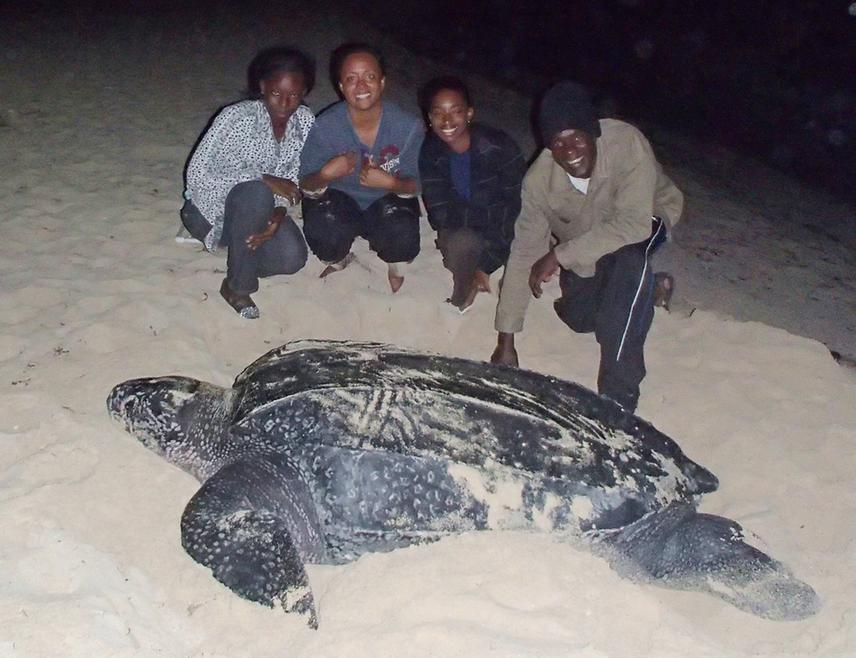Social media video featuring the project.
Unbelievable Leatherback Rescue,
25 Jun 2014 Carriacou Island, Grenada, Central and Latin America Marine | Education | Turtles
Conservation of Nesting Leatherback & Hawksbill Turtles Populations and their Habitats in Carriacou Island, Grenada, West Indies
Critically Endangered Leatherback & Hawksbill Turtles Conservation through Nesting Monitoring & Raising Awareness of Biodiversity & Small Island Ecosystems, Carriacou, Grenada, West Indies
Community Based Conservation of Critically Endangered Nesting Sea Turtles, Habitat Restoration, Youth Environmental Education, Carriacou, Grenada, W. I.
Critically Endangered Nesting Sea Turtles Conservation, Mangrove Ecosystem Restoration and Youth Environmental Education & Conservation Activities in Carriacou, Grenada (W.I.)
Nesting Leatherback & Hawksbill turtle population conservation, environmental education for youths through island biodiversity exploration, educational games & IT research.

Nesting sea turtle monitoring-tagging-
Teams of local guides and volunteers/research assistant monitor every night (from 8pm to 5am) and early morning leatherback/hawksbill activities on the three main nesting beaches of Carriacou, within High North proposed National Park and adjacent area.
Sea turtles are tagged after nesting with unique numbered tags & measured.
Each nest location is recorded to monitor hatchlings’ birth & anti-poaching strategies are applied by disguising nests & tracks and relocating nests in ways that poachers fail to detect them.
KIDO Foundation follows WIDECAST protocol procedures for monitoring & data collection.
Nature Guide Training-
Level 1 KIDO Nature Guide training is offered to new candidates, utilizing the educational materials and programs (Power Point presentations, brochures, videos and field trips) created during the first KIDO-Rufford project 2011-2012
Youth Environmental Education-
At KIDO Foundation facilities, students (age 9-16) follow after-school sessions promoting environmental conservation through:
Solution-oriented educational team-games sessions & classroom of ‘self-learning’ web research
Original photo/video documentation of island wildlife, natural habitats, species inter-dependence and environmental degradation
KIDO Eco-Game is an educational tool, played by 16 students (4 Teams) around an 8x4ft wooden platform (developed with references to ‘World Game’ by Buckminster Fuller and ‘World Peace Game’ by John Hunter). The Game’s goal is ‘To find viable solutions to a pre-determined environmental problem known in the world and also applicable to Carriacou island’.
The Teams compete to solve an environmental problem using Internet research to acquire scientific information to win the Game session. The Game is won when a solution is produced with the consensus of all Teams. The facilitators remain observers in the Game, providing thought-provoking questions and guiding hints and they supervise the online research of the Teams, who are equipped with iPad tablets and a large monitor (computer games are banned at KIDO Foundation).
The ‘self-learning’ web research method is based on ‘School in the Clouds’, an innovative education program developed by Dr. Sugata Mitra, proven to enhance the learning process among socially disadvantaged youths. KIDO applies the ‘self-learning’ method to teach environmental education in a challenging game format. Each Eco-Game chapter introduces new challenges to be solved.
During field-trips around the island of Carriacou, the youths will gather photos/videos documenting environmental issues, their causes and how people, wildlife and the environment are affected and, as a final result, the kids involved will produce a video showcasing their learning process.
Social media video featuring the project.
Unbelievable Leatherback Rescue,